burnin1
Well-Known Member
From huffingtonpost.com
When Misguided Cops Turn The War On Weed Into A War On Growing Things
The Huffington Post | By Nick Wing

If law enforcement officials around the country are going to continue cracking down on marijuana grow operations, especially in heavily armed, unannounced raids, maybe they should consider hiring a botanist or two.
Earlier this month, Dwayne Perry of Cartersville, Georgia, was startled out of his bed by a low-flying helicopter. Moments later, WSB-TV reports, heavily armed officers and K-9 units with the Governor's Task Force for drug suppression showed up, apparently believing they were about to make a weed bust. What they found instead: okra. The vegetable.
Perry was confused and frightened by the incident. The officers were "strapped to the gills," he told the station. While Perry claimed his reputation may have been damaged by the mistake, he said he also realized that his life was put in danger because of it.
While law enforcement often trumpets successful anti-drug operations, agencies are less eager to admit when drug raids are marred by tragic miscalculations. Law enforcement's heavy-handed tactics have led to the death or injury of a number of innocent victims. Earlier this year, deputies threw a stun grenade in the crib of a 19-month-old, resulting in severe burns to the child. The sought-after suspect wasn't home at the time, and the officers ultimately avoided charges, with the sheriff suggesting the accident was unavoidable.
In another recent incident, a 59-year-old was gunned down by a SWAT team in a no-knock raid, as he believed his home was being burglarized for the second time in as many days. Officers were operating on a tip given to them by a meth addict.
Getting it right isn't always easy, but when the consequences of getting it wrong can be so dire, errors understandably attract criticism. Many of the stories below are the result of a combination of poor plant identification skills, questionable tips from the public and rushed or unprofessional conduct by law enforcement. These mistakes, even when made with the best intentions, show the risks associated with a war on drugs that often prioritizes harsh prohibition of both marijuana and other drugs over concerns for public safety, civil liberties and due caution.
Weed, But Not That Kind
The war on drugs has long been a cash cow for local law enforcement agencies that receive funding based on the number of arrests and the value of assets forfeited during drug busts. Critics claim this system of incentivization can make officers see what they want to see -- perhaps a grove of marijuana plants -- rather than what is actually there -- say, a field of giant ragweed.
In 2001, members of the Texas Capital Area Drug Task Force -- a controversial federally funded anti-narcotics unit that gained notoriety when it botched a number of high-profile raids in the early 2000s -- forced its way into a residence, after a circling helicopter said it had spotted a large marijuana grow operation on the property. Entering with guns drawn and without a warrant, the officers aggressively confronted the house's occupants, including a Vietnam veteran and a widow. Behind the house, the offending plant they found was ragweed. The mistake led to a lawsuit, which was eventually settled for $40,000.
It would be one of three botched raids by the task force in under a year. Two of the raids led to innocent fatalities, and eventually resulted in the task force being taken over by the governor's office.
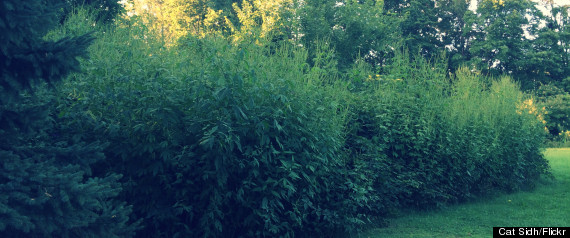
Giant ragweed (seen in the file photo above) is not marijuana.
In 2010, cops in Corpus Christi, Texas, were similarly duped by an innocuous weed when they uprooted, tagged and transported 400 plants from a city park, believing it was marijuana. The plant was actually horsemint, meaning that taxpayers footed the bill for some glorified yard work that day.
Texas police are not the only ones to have been perplexed by herbs in the past. In 1994, officers in Connecticut mistook oregano, apple mint, catnip and other plants for marijuana after entering a vacant grocery store with a warrant to confiscate weed. They found no drugs.
The War On Gardening
Adlynn and Robert Harte, two former CIA employees living in Kansas, opened their door on April 20, 2012, to find a team of sheriff's deputies armed with assault weapons and bulletproof vests with a warrant to search their house for marijuana. The Hartes and their two children were detained and held at gunpoint while law enforcement raided their house. They found three tomato plants, one melon plant and two butternut squash plants growing in a basement hydroponic gardening setup built by Harte and his 13-year-old son, whom officers reportedly accused of being a pothead.

Harte stands next to his now-defunct indoor garden in the basement of his home in Leawood, Kan., Friday, March 29, 2013. (AP Photo/Orlin Wagner)
In November 2013, the Hartes filed a lawsuit against county officials, including the sheriff, alleging the only intelligence that could have led to the raid was a trip by Harte and his son to a gardening store and his wife's "brewing of loose tea leaves that they discarded in the trash." The lawsuit, seeking $7 million in damages, claims deputies failed to do a proper investigation to follow up on whether the family was actually growing marijuana.
The Hartes aren't alone in questioning whether such police techniques don't risk effectively criminalizing gardening. A few states over in Illinois, Angela Kirking, a face-paint artist, was also caught up in part of the same multi-state garden store operation last year. Three weeks after being observed by an officer leaving a local shop with a "green plastic bag containing unknown items," Drug Enforcement Administration agents, guns drawn, raided her house before 5 a.m., eventually turning up enough marijuana for a misdemeanor possession charge.
Kirking claimed she had visited the garden store to buy fertilizer for a hibiscus plant, and sued to have the search warrant thrown out. She argued that an innocent trip to a garden store shouldn't have served on its own as grounds for an investigation, which included officers rooting through her trash to find a small quantity of marijuana stems and examining her electric bills to conclude they were higher than normal. A county judge later ruled against Kirking.
Fiasco At The Garden of Eden
In August 2013, police in Arlington, Texas, conducted a SWAT raid on the Garden of Eden, a small organic farm that had clashed with its neighbors, who claimed the property wasn't clean enough.
The Arlington Police Department also reported receiving complaints that marijuana was being grown on the premises, a tip they pursued with aerial surveillance and a visit by an undercover officer that led to an unsubstantiated claim that a resident of the farm was in possession of marijuana. Despite the seemingly flimsy evidence, police then conducted a 10-hour raid, in which employees of the farm were reportedly handcuffed and held at gunpoint for at least 30 minutes. Officers came away with "17 blackberry bushes, 15 okra plants, 14 tomatillo plants ... native grasses and sunflowers." No weed.
The would-be drug bust was itself a total bust, but police officials defended their actions because the militarized crackdown did lead to the correction of code violations, for which the city took the Garden of Eden to court earlier this year.
A Middle School Marijuana Grow Operation?
That's what police apparently thought they might find when four armed agents, backed up by a helicopter, showed up to the Camino de Paz Montessori School and Farm in Cuarteles, New Mexico, in 2010. After asking to inspect the school's greenhouse, in which students were growing plants as part of a math and science lesson, officers found tomatoes. The incident led some to question whether these sorts of raids were an appropriate use of funds.
You Say Tomato, They Say Marijuana
In Canada in 2008, armed Royal Canadian Mounted Police raided commercial fisherman Bruce Aleksich's business, expecting to uncover a large marijuana grow operation. They handcuffed everyone in the place and left them on the ground for more than an hour, Aleksich said. After checking the premises and vehicles for drugs, all the police could find were tomatoes. In a very un-Canadian exit, officers reportedly left without so much as an apology.
No tomato plant is safe.
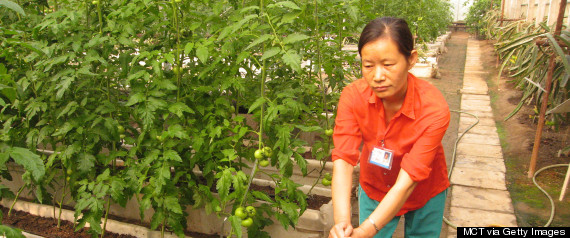
Tomato and marijuana plants are similar in that they both have green leaves.
Okra (Again)
In another case of mistaken identity in 2002, La Porte Police Department officers who, according to the Houston Chronicle, had "experience identifying marijuana plants," obtained a search warrant for 88-year-old Irene Gilliam Hensley's property after being unable to tell the difference between okra and pot.
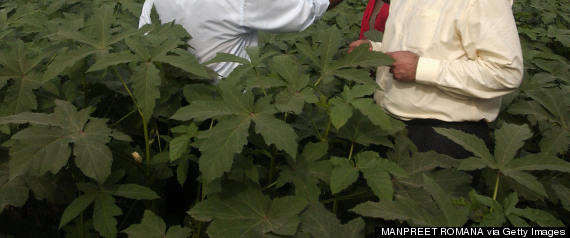
This is not marijuana. With five thick leaflets of varying sizes, the okra leaf actually looks significantly different from a pot leaf if you look at it at all.
Officers conducted the raid after receiving a tip that Hensley's grandson was growing marijuana. The information reportedly came from a 15-year-old cousin with whom Hensley's grandson had been feuding.
Questionable tips or eyewitness accounts often serve as the basis for botched or unnecessary drug raids. In 2008 in England -- where police response to marijuana cultivation is arguably less militarized than in the U.S. -- police received a tip that shopkeeper Amrat Kanji was growing pot in the attic of his store. Officers reportedly entered his business and rudely kicked customers out before heading upstairs to find the offending shrubbery, a curry leaf plant.
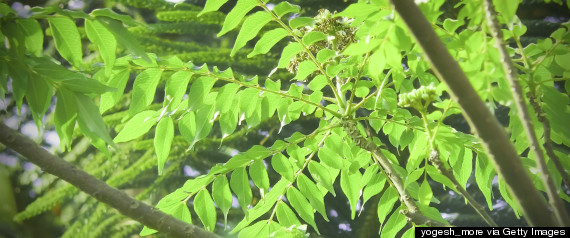
Curry leaves. Way to go, boys.
High-biscus?
Hibiscus doesn't look much like marijuana, but police confusion led to a scary incident for landscape contractor Blair Davis in 2004. Davis said he was headed to answer a knock at the door when it flew open and an officer pointed a gun at him and told him to get on the ground. Around 10 members of a county task force proceeded to enter his house and question him about the plants in his yard, none of which were marijuana. The officers left after an hour, leaving only a "citizen's information card." Davis said the officers could have used additional training in marijuana identification.
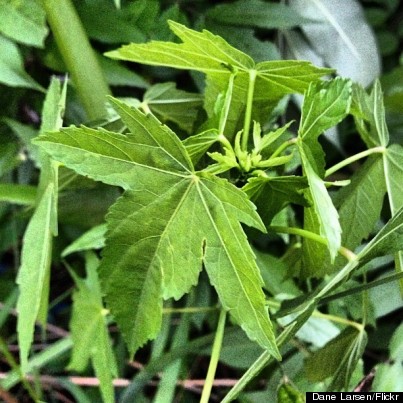
This is a Texas Star hibiscus bush. It only looks like marijuana if you really, really want it to.
The Canadian war on drugs can boast a still more aggressive crackdown on a flower patch, when in 2012 Alberta police confiscated more than 1,600 "marijuana" plants -- that were actually Montauk daisies. Officers reportedly made the bust without first consulting a local unit that's dedicated to investigating marijuana grow operations. Presumably, those officers would have known the difference between marijuana and a daisy plant.
Enough Kenaf
One might be able to excuse initial confusion here, as kenaf -- a plant that grows in stalks and is traditionally used for its fibers -- has leaves that look somewhat like those of a marijuana plant.
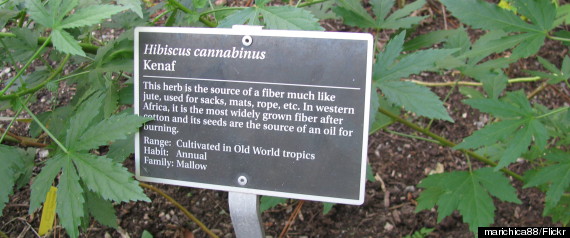
In Mississippi in 2005, however, Marion Waltman didn't even get a chance to plead his case before police officers began cutting down more than 500 kenaf plants that he was growing as deer food. There may not have been much he could have done, as officers conducted a field test on the plants that suggested they weren't marijuana, and then proceeded with the operation.
Waltman later sued the sheriff for destruction of $225,000 in property. The case made it to federal court, where a judge ruled that Waltman hadn't shown that the mistake was "deliberate indifference" on the part of the sheriff and his deputies, and that they were therefore protected by qualified immunity.
Your Weed Smells Of Elderberries
In 1992, a Florida family claimed they were "cursed at, threatened at gunpoint and ordered to lie face down in their yard while two dozen deputies swarmed their property" looking for marijuana and growing equipment. The search, conducted without a warrant, came when a deputy followed up on a tip and found what he thought to be marijuana. It was an elderberry bush, which explains why officers found no evidence of drugs or drug-related equipment.
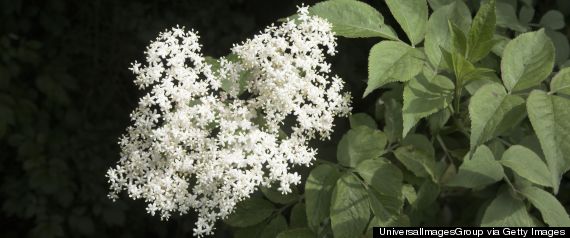
Seriously, this looks nothing like marijuana.
The family sued the police department for the mix-up and eventually agreed to a $40,000 settlement that came complete with a public apology by the county sheriff.
When A Plant Isn't A Plant At All
Officer Claude Weinert's first police raid was a complete failure. Responding to a report of a fire in a south Chicago suburb, Weinert spotted what he though was a marijuana plant growing in the second-story window of a house. He got a search warrant, his first as a cop, and returned with "two patrol officers and three plainclothes narcotics officers" to conduct the raid. The bust turned up a plastic plant, covered in lizards. The homeowner's son had purchased it as a place for the family's seven pet lizards to hang out.
The Nose Knows
In Quebec in 2011, officers learned the importance of conducting a thorough investigation before authorizing a raid. Despite having thermal imaging that they said suggested the home of Oliver MacQuat was a marijuana grow operation, police said they based their initial suspicions on a strong, skunky smell, often associated with weed. In the end, however, the culprit was an actual skunk that lived under the family's shed. MacQuat filed a suit following the raid and eventually settled out of court.

Oops.
And in England in 2011, a couple in their late 50s drew police attention after neighbors reported that teenagers had been asking to buy marijuana at their house. After allowing a drug squad into their back yard, the confusion was proven to be the result of a patch of moss phlox in their backyard, which apparently smells enough like weed that it fooled a drug-sniffing dog, as well as a number of teens looking to get high.
When Misguided Cops Turn The War On Weed Into A War On Growing Things
The Huffington Post | By Nick Wing

If law enforcement officials around the country are going to continue cracking down on marijuana grow operations, especially in heavily armed, unannounced raids, maybe they should consider hiring a botanist or two.
Earlier this month, Dwayne Perry of Cartersville, Georgia, was startled out of his bed by a low-flying helicopter. Moments later, WSB-TV reports, heavily armed officers and K-9 units with the Governor's Task Force for drug suppression showed up, apparently believing they were about to make a weed bust. What they found instead: okra. The vegetable.
Perry was confused and frightened by the incident. The officers were "strapped to the gills," he told the station. While Perry claimed his reputation may have been damaged by the mistake, he said he also realized that his life was put in danger because of it.
While law enforcement often trumpets successful anti-drug operations, agencies are less eager to admit when drug raids are marred by tragic miscalculations. Law enforcement's heavy-handed tactics have led to the death or injury of a number of innocent victims. Earlier this year, deputies threw a stun grenade in the crib of a 19-month-old, resulting in severe burns to the child. The sought-after suspect wasn't home at the time, and the officers ultimately avoided charges, with the sheriff suggesting the accident was unavoidable.
In another recent incident, a 59-year-old was gunned down by a SWAT team in a no-knock raid, as he believed his home was being burglarized for the second time in as many days. Officers were operating on a tip given to them by a meth addict.
Getting it right isn't always easy, but when the consequences of getting it wrong can be so dire, errors understandably attract criticism. Many of the stories below are the result of a combination of poor plant identification skills, questionable tips from the public and rushed or unprofessional conduct by law enforcement. These mistakes, even when made with the best intentions, show the risks associated with a war on drugs that often prioritizes harsh prohibition of both marijuana and other drugs over concerns for public safety, civil liberties and due caution.
Weed, But Not That Kind
The war on drugs has long been a cash cow for local law enforcement agencies that receive funding based on the number of arrests and the value of assets forfeited during drug busts. Critics claim this system of incentivization can make officers see what they want to see -- perhaps a grove of marijuana plants -- rather than what is actually there -- say, a field of giant ragweed.
In 2001, members of the Texas Capital Area Drug Task Force -- a controversial federally funded anti-narcotics unit that gained notoriety when it botched a number of high-profile raids in the early 2000s -- forced its way into a residence, after a circling helicopter said it had spotted a large marijuana grow operation on the property. Entering with guns drawn and without a warrant, the officers aggressively confronted the house's occupants, including a Vietnam veteran and a widow. Behind the house, the offending plant they found was ragweed. The mistake led to a lawsuit, which was eventually settled for $40,000.
It would be one of three botched raids by the task force in under a year. Two of the raids led to innocent fatalities, and eventually resulted in the task force being taken over by the governor's office.

Giant ragweed (seen in the file photo above) is not marijuana.
In 2010, cops in Corpus Christi, Texas, were similarly duped by an innocuous weed when they uprooted, tagged and transported 400 plants from a city park, believing it was marijuana. The plant was actually horsemint, meaning that taxpayers footed the bill for some glorified yard work that day.
Texas police are not the only ones to have been perplexed by herbs in the past. In 1994, officers in Connecticut mistook oregano, apple mint, catnip and other plants for marijuana after entering a vacant grocery store with a warrant to confiscate weed. They found no drugs.
The War On Gardening
Adlynn and Robert Harte, two former CIA employees living in Kansas, opened their door on April 20, 2012, to find a team of sheriff's deputies armed with assault weapons and bulletproof vests with a warrant to search their house for marijuana. The Hartes and their two children were detained and held at gunpoint while law enforcement raided their house. They found three tomato plants, one melon plant and two butternut squash plants growing in a basement hydroponic gardening setup built by Harte and his 13-year-old son, whom officers reportedly accused of being a pothead.

Harte stands next to his now-defunct indoor garden in the basement of his home in Leawood, Kan., Friday, March 29, 2013. (AP Photo/Orlin Wagner)
In November 2013, the Hartes filed a lawsuit against county officials, including the sheriff, alleging the only intelligence that could have led to the raid was a trip by Harte and his son to a gardening store and his wife's "brewing of loose tea leaves that they discarded in the trash." The lawsuit, seeking $7 million in damages, claims deputies failed to do a proper investigation to follow up on whether the family was actually growing marijuana.
The Hartes aren't alone in questioning whether such police techniques don't risk effectively criminalizing gardening. A few states over in Illinois, Angela Kirking, a face-paint artist, was also caught up in part of the same multi-state garden store operation last year. Three weeks after being observed by an officer leaving a local shop with a "green plastic bag containing unknown items," Drug Enforcement Administration agents, guns drawn, raided her house before 5 a.m., eventually turning up enough marijuana for a misdemeanor possession charge.
Kirking claimed she had visited the garden store to buy fertilizer for a hibiscus plant, and sued to have the search warrant thrown out. She argued that an innocent trip to a garden store shouldn't have served on its own as grounds for an investigation, which included officers rooting through her trash to find a small quantity of marijuana stems and examining her electric bills to conclude they were higher than normal. A county judge later ruled against Kirking.
Fiasco At The Garden of Eden
In August 2013, police in Arlington, Texas, conducted a SWAT raid on the Garden of Eden, a small organic farm that had clashed with its neighbors, who claimed the property wasn't clean enough.
The Arlington Police Department also reported receiving complaints that marijuana was being grown on the premises, a tip they pursued with aerial surveillance and a visit by an undercover officer that led to an unsubstantiated claim that a resident of the farm was in possession of marijuana. Despite the seemingly flimsy evidence, police then conducted a 10-hour raid, in which employees of the farm were reportedly handcuffed and held at gunpoint for at least 30 minutes. Officers came away with "17 blackberry bushes, 15 okra plants, 14 tomatillo plants ... native grasses and sunflowers." No weed.
The would-be drug bust was itself a total bust, but police officials defended their actions because the militarized crackdown did lead to the correction of code violations, for which the city took the Garden of Eden to court earlier this year.
A Middle School Marijuana Grow Operation?
That's what police apparently thought they might find when four armed agents, backed up by a helicopter, showed up to the Camino de Paz Montessori School and Farm in Cuarteles, New Mexico, in 2010. After asking to inspect the school's greenhouse, in which students were growing plants as part of a math and science lesson, officers found tomatoes. The incident led some to question whether these sorts of raids were an appropriate use of funds.
You Say Tomato, They Say Marijuana
In Canada in 2008, armed Royal Canadian Mounted Police raided commercial fisherman Bruce Aleksich's business, expecting to uncover a large marijuana grow operation. They handcuffed everyone in the place and left them on the ground for more than an hour, Aleksich said. After checking the premises and vehicles for drugs, all the police could find were tomatoes. In a very un-Canadian exit, officers reportedly left without so much as an apology.
No tomato plant is safe.

Tomato and marijuana plants are similar in that they both have green leaves.
Okra (Again)
In another case of mistaken identity in 2002, La Porte Police Department officers who, according to the Houston Chronicle, had "experience identifying marijuana plants," obtained a search warrant for 88-year-old Irene Gilliam Hensley's property after being unable to tell the difference between okra and pot.

This is not marijuana. With five thick leaflets of varying sizes, the okra leaf actually looks significantly different from a pot leaf if you look at it at all.
Officers conducted the raid after receiving a tip that Hensley's grandson was growing marijuana. The information reportedly came from a 15-year-old cousin with whom Hensley's grandson had been feuding.
Questionable tips or eyewitness accounts often serve as the basis for botched or unnecessary drug raids. In 2008 in England -- where police response to marijuana cultivation is arguably less militarized than in the U.S. -- police received a tip that shopkeeper Amrat Kanji was growing pot in the attic of his store. Officers reportedly entered his business and rudely kicked customers out before heading upstairs to find the offending shrubbery, a curry leaf plant.

Curry leaves. Way to go, boys.
High-biscus?
Hibiscus doesn't look much like marijuana, but police confusion led to a scary incident for landscape contractor Blair Davis in 2004. Davis said he was headed to answer a knock at the door when it flew open and an officer pointed a gun at him and told him to get on the ground. Around 10 members of a county task force proceeded to enter his house and question him about the plants in his yard, none of which were marijuana. The officers left after an hour, leaving only a "citizen's information card." Davis said the officers could have used additional training in marijuana identification.

This is a Texas Star hibiscus bush. It only looks like marijuana if you really, really want it to.
The Canadian war on drugs can boast a still more aggressive crackdown on a flower patch, when in 2012 Alberta police confiscated more than 1,600 "marijuana" plants -- that were actually Montauk daisies. Officers reportedly made the bust without first consulting a local unit that's dedicated to investigating marijuana grow operations. Presumably, those officers would have known the difference between marijuana and a daisy plant.
Enough Kenaf
One might be able to excuse initial confusion here, as kenaf -- a plant that grows in stalks and is traditionally used for its fibers -- has leaves that look somewhat like those of a marijuana plant.

In Mississippi in 2005, however, Marion Waltman didn't even get a chance to plead his case before police officers began cutting down more than 500 kenaf plants that he was growing as deer food. There may not have been much he could have done, as officers conducted a field test on the plants that suggested they weren't marijuana, and then proceeded with the operation.
Waltman later sued the sheriff for destruction of $225,000 in property. The case made it to federal court, where a judge ruled that Waltman hadn't shown that the mistake was "deliberate indifference" on the part of the sheriff and his deputies, and that they were therefore protected by qualified immunity.
Your Weed Smells Of Elderberries
In 1992, a Florida family claimed they were "cursed at, threatened at gunpoint and ordered to lie face down in their yard while two dozen deputies swarmed their property" looking for marijuana and growing equipment. The search, conducted without a warrant, came when a deputy followed up on a tip and found what he thought to be marijuana. It was an elderberry bush, which explains why officers found no evidence of drugs or drug-related equipment.

Seriously, this looks nothing like marijuana.
The family sued the police department for the mix-up and eventually agreed to a $40,000 settlement that came complete with a public apology by the county sheriff.
When A Plant Isn't A Plant At All
Officer Claude Weinert's first police raid was a complete failure. Responding to a report of a fire in a south Chicago suburb, Weinert spotted what he though was a marijuana plant growing in the second-story window of a house. He got a search warrant, his first as a cop, and returned with "two patrol officers and three plainclothes narcotics officers" to conduct the raid. The bust turned up a plastic plant, covered in lizards. The homeowner's son had purchased it as a place for the family's seven pet lizards to hang out.
The Nose Knows
In Quebec in 2011, officers learned the importance of conducting a thorough investigation before authorizing a raid. Despite having thermal imaging that they said suggested the home of Oliver MacQuat was a marijuana grow operation, police said they based their initial suspicions on a strong, skunky smell, often associated with weed. In the end, however, the culprit was an actual skunk that lived under the family's shed. MacQuat filed a suit following the raid and eventually settled out of court.

Oops.
And in England in 2011, a couple in their late 50s drew police attention after neighbors reported that teenagers had been asking to buy marijuana at their house. After allowing a drug squad into their back yard, the confusion was proven to be the result of a patch of moss phlox in their backyard, which apparently smells enough like weed that it fooled a drug-sniffing dog, as well as a number of teens looking to get high.



